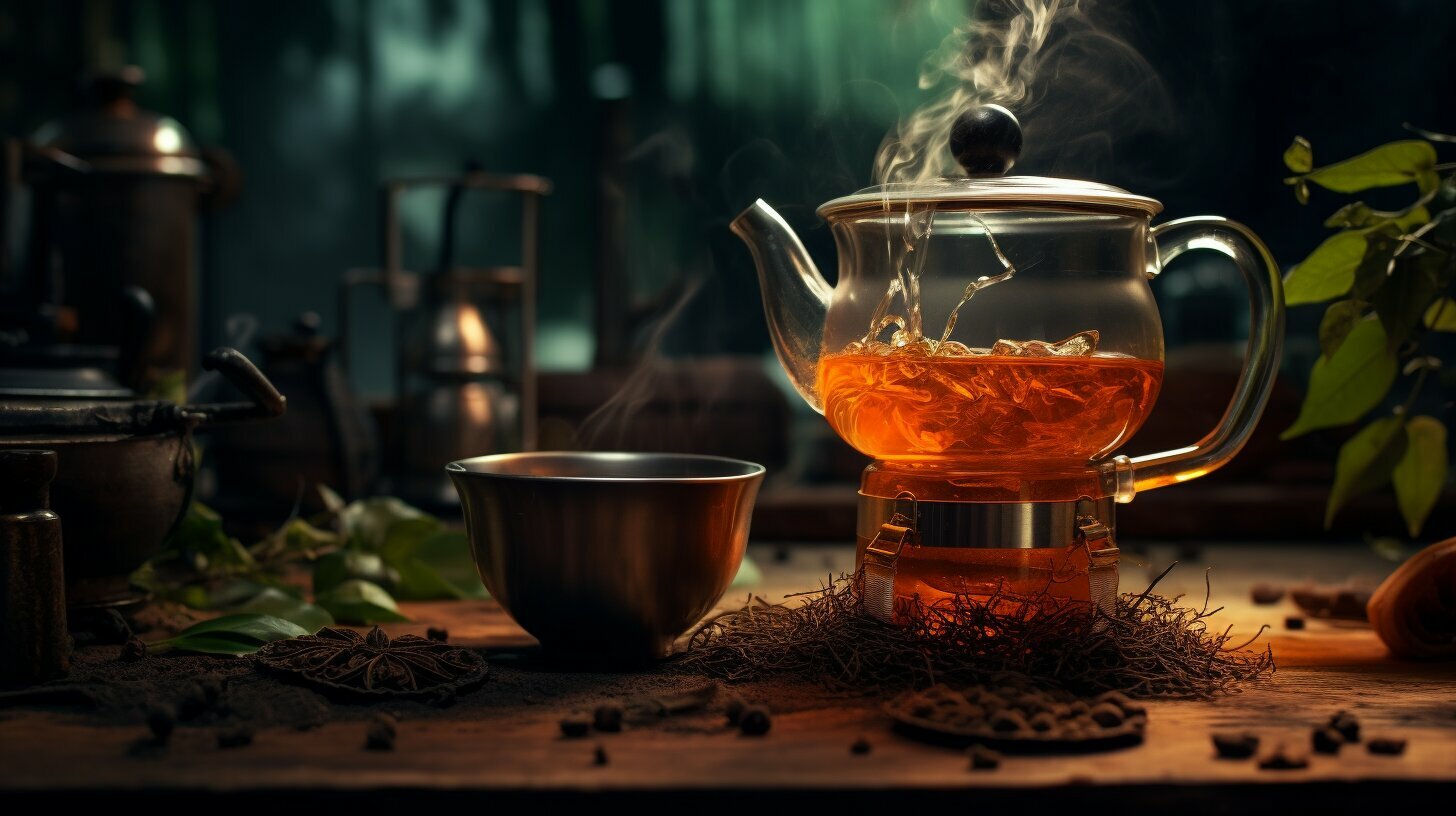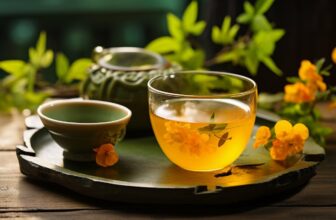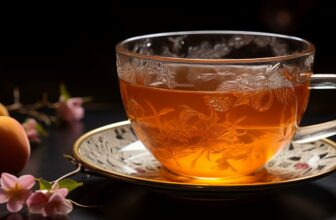
Thai tea is beloved for its unique flavors, but many wonder just how much caffeine it contains. In this article, we will explore the caffeine content found in Thai tea, providing you with the answers you’ve been seeking. So, let’s unmask the truth behind the caffeine levels in this popular Asian beverage.
Key Takeaways:
- Thai tea typically contains between 30-60 mg of caffeine per 8-ounce cup.
- Caffeine content can vary depending on the type of tea used and how it is prepared.
- Thai tea generally has less caffeine than coffee.
- It is important to consume Thai tea in moderation, especially for those sensitive to caffeine.
- Thai tea is known for its indulgent and refreshing flavors.
Understanding Thai Tea and its Ingredients
Thai tea is a blend of black tea, spices, and sweetened condensed milk, creating a rich and indulgent flavor profile. This vibrant beverage is typically served iced, making it a popular choice for beating the heat in Thailand and beyond.
When it comes to caffeine content, Thai tea contains a moderate amount. On average, an 8-ounce cup of Thai tea usually contains between 30-60 mg of caffeine. However, it’s important to note that the exact amount can vary depending on various factors, such as the type of tea used and the brewing method.
What sets Thai tea apart from other teas is its unique combination of flavors. The black tea base provides a bold and robust taste, while the spices, such as star anise and tamarind, add a delightful twist. The addition of sweetened condensed milk gives Thai tea its creamy and sweet characteristics, making it a truly indulgent treat.
Thai Tea Caffeine Comparison
Compared to a cup of coffee, Thai tea generally contains less caffeine. A typical cup of coffee can contain anywhere between 95-200 mg of caffeine, depending on factors like the brewing method and the type of coffee bean used. This makes Thai tea a suitable alternative for those who are looking for a flavorful beverage with a more moderate caffeine content.
| Beverage | Caffeine Content (per 8-ounce serving) |
|---|---|
| Thai Tea | 30-60 mg |
| Coffee | 95-200 mg |
However, it’s important to remember that individual sensitivity to caffeine can vary. Some individuals may be more sensitive to its effects and may need to consume Thai tea in moderation, particularly if they are trying to limit their overall caffeine intake. It’s always a good idea to listen to your body and adjust your consumption accordingly.
Exploring the Caffeine Content in Thai Tea
On average, an 8-ounce cup of Thai tea contains between 30-60 mg of caffeine. The exact amount can vary depending on the type of tea used and how it is prepared. Thai tea is made with a blend of black tea, spices, and sweetened condensed milk, and is often served iced. It is known for its unique and vibrant flavors, and is popular for its refreshing and indulgent taste. While Thai tea does contain caffeine, it generally has less caffeine than a cup of coffee.
To put it into perspective, an 8-ounce cup of brewed coffee typically contains about 95 mg of caffeine. So, if you’re looking for a flavorful and refreshing alternative with a lower caffeine content, Thai tea is a great choice.
It’s worth noting that caffeine sensitivity varies from person to person. Some individuals may be more sensitive to caffeine’s effects, experiencing symptoms like jitters or difficulty sleeping. If you fall into this category or simply prefer to limit your caffeine intake, enjoying Thai tea in moderation is key. You can still savor the delicious flavors while being mindful of your caffeine consumption.
In summary, Thai tea contains caffeine, with an 8-ounce cup generally containing between 30-60 mg. It offers a delightful alternative to high-caffeine beverages like coffee. Whether you’re enjoying it in a cozy café or preparing it at home, Thai tea is a refreshing and indulgent treat that can be enjoyed responsibly within your caffeine limits.
| Thai Tea | Caffeine Content |
|---|---|
| 8-ounce cup | 30-60 mg |
| 8-ounce cup of brewed coffee | approximately 95 mg |
Factors Affecting Caffeine Levels in Thai Tea
The caffeine content in Thai tea can be influenced by the specific type of tea leaves and the brewing method employed. Different varieties of tea leaves contain varying amounts of caffeine, and this is true for Thai tea as well. The type of tea used can range from black tea to green tea or a combination of both, and each can have different caffeine levels. Additionally, the brewing method plays a role in the caffeine content. Traditional Thai tea is often steeped for a longer duration, which can result in a higher caffeine concentration compared to teas that are brewed for shorter periods.
To further understand the factors affecting caffeine levels in Thai tea, consider the following:
- The type of tea leaves: Some varieties of tea leaves naturally contain more caffeine than others. Black tea, for example, tends to have higher caffeine levels compared to green or white tea.
- The brewing time: Steeping Thai tea for a longer duration allows for greater caffeine extraction. The longer the tea is steeped, the higher the caffeine content is likely to be.
- The brewing temperature: Higher water temperatures can enhance the release of caffeine during the steeping process. Hotter water may result in a higher caffeine concentration in the brewed Thai tea.
It’s important to note that these factors may contribute to variations in the caffeine content of Thai tea. Individual preferences in terms of tea strength and brewing techniques can further impact how much caffeine is extracted. To enjoy Thai tea with a lower caffeine content, one can consider using a lighter variety of tea leaves or adjusting the brewing time to ensure a shorter steeping period. Exploring different brewing methods and experimenting with various tea leaves can help individuals tailor their Thai tea experience according to their desired caffeine levels.
| Factors | Caffeine Effect |
|---|---|
| Type of Tea Leaves | Different types of tea leaves contain varying amounts of caffeine, impacting the caffeine content in Thai tea. |
| Brewing Time | Longer steeping durations can result in higher caffeine levels, while shorter brewing times may yield a more moderate amount. |
| Brewing Temperature | Higher water temperatures can enhance caffeine extraction, potentially leading to increased caffeine levels in Thai tea. |
Thai Tea vs. Coffee: Comparing Caffeine Strength
While Thai tea does contain caffeine, it generally has less caffeine than a cup of coffee. This popular Asian beverage is made with a blend of black tea, spices, and sweetened condensed milk, known for its refreshing and indulgent taste. Thai tea is often served iced, making it a perfect choice to cool down on a hot day.
To put the caffeine content into perspective, a typical 8-ounce cup of Thai tea contains approximately 30-60 mg of caffeine. In comparison, the average 8-ounce cup of coffee can have anywhere between 95-165 mg of caffeine. This means that Thai tea offers a milder caffeine boost compared to coffee.
Considering the lower caffeine content, Thai tea can be a great alternative for those who are sensitive to caffeine or looking to reduce their overall intake. However, it’s important to note that individual reactions to caffeine can vary, so it’s always best to listen to your body and consume Thai tea in moderation.
| Thai Tea | Coffee |
|---|---|
| Ranges from 30-60 mg of caffeine per 8-ounce serving | Ranges from 95-165 mg of caffeine per 8-ounce serving |
| Milder caffeine boost | Stronger caffeine kick |
| Refreshing and indulgent taste | Bold and robust flavor |
So, whether you prefer the vibrant flavors of Thai tea or the bold taste of coffee, it’s good to know that Thai tea generally contains less caffeine. Enjoying a cup of Thai tea can be a delightful way to indulge in a caffeinated beverage without the same level of intensity as coffee, making it a great choice for those looking for a flavorful and refreshing option.
Moderation and Caffeine Sensitivity
As with any caffeinated beverage, it is essential to be mindful of your caffeine consumption, particularly if you are sensitive to its effects. Thai tea, like other teas, contains caffeine, although in varying amounts. Each 8-ounce cup of Thai tea typically contains between 30-60 mg of caffeine, depending on factors such as the type of tea used and the brewing method.
For individuals who are sensitive to caffeine or those who wish to limit their overall caffeine intake, it is important to consume Thai tea in moderation. It’s worth noting that Thai tea generally has less caffeine than a cup of coffee, making it a suitable alternative for those looking for a refreshing and indulgent drink with a more moderate caffeine content.
To ensure you manage your caffeine intake effectively, it can be helpful to pay attention to serving sizes and consider enjoying Thai tea as part of a well-balanced diet. By being mindful of your caffeine quantity and listening to your body’s response, you can savor the flavors of Thai tea while still meeting your personal preferences and needs.
Practical Tips for Enjoying Thai Tea Responsibly:
- Choose smaller serving sizes to limit caffeine intake.
- Consider drinking Thai tea earlier in the day to minimize any potential disruption to sleep patterns.
- If you are particularly sensitive to caffeine, opt for decaffeinated Thai tea options if available.
- Experiment with homemade Thai tea recipes, allowing you to control the amount of tea and sweetened condensed milk used.
- Listen to your body and adjust your consumption based on your individual tolerance and preferences.
By keeping these tips in mind, you can enjoy the unique and vibrant flavors of Thai tea while managing your caffeine intake responsibly. Remember, moderation is key when it comes to caffeine, and being aware of your personal limits will help you make informed choices about your beverage consumption.
| Beverage | Caffeine Content (per 8-ounce serving) |
|---|---|
| Thai Tea | 30-60 mg |
| Black Tea | 25-48 mg |
| Coffee | 95 mg (drip brewed) |
| Green Tea | 25-29 mg |
Enjoying Thai Tea Responsibly
If you love the taste of Thai tea but want to be more conscious of your caffeine intake, here are some helpful strategies to consider:
- Choose a decaffeinated version: If you enjoy the flavors of Thai tea but wish to avoid the stimulating effects of caffeine, opt for decaffeinated Thai tea. This version of the beverage offers a caffeine-free alternative without compromising on taste.
- Opt for smaller servings: To reduce your overall caffeine consumption, consider enjoying smaller servings of Thai tea. Instead of a large 16-ounce glass, opt for a smaller 8-ounce cup. This way, you can still savor the flavors of Thai tea without consuming excessive amounts of caffeine.
- Combine with other herbal teas: If you’re looking to further reduce your caffeine intake, consider mixing Thai tea with other herbal teas that are naturally caffeine-free. For example, you can blend Thai tea with chamomile tea or mint tea to create a unique and refreshing infusion.
- Alternate with caffeine-free beverages: To strike a balance between enjoying Thai tea and managing your caffeine intake, alternate it with caffeine-free beverages throughout the day. This can include herbal teas, fruit-infused water, or decaf variants of your favorite beverages.
To help you make informed choices, here is a table comparing the approximate caffeine levels in an 8-ounce serving of Thai tea versus coffee:
| Drink | Caffeine Level |
|---|---|
| Thai Tea | 30-60 mg |
| Coffee | 95-200 mg |
“If you love the taste of Thai tea but want to be more conscious of your caffeine intake, here are some helpful strategies to consider.”
Conclusion
Thai tea offers a delightful and indulgent beverage option with unique flavors that are loved by many. While it does contain caffeine, typically between 30-60 mg per 8-ounce cup, Thai tea generally has less caffeine than a cup of coffee. By being mindful of your caffeine intake and incorporating the strategies mentioned above, you can continue to enjoy the flavors of Thai tea responsibly while managing your caffeine consumption effectively.
Conclusion
Thai tea offers a delightful and refreshing experience, with a moderate amount of caffeine that is generally lower than coffee. Enjoy this popular Asian beverage in moderation to relish its flavors while staying mindful of your overall caffeine consumption.
Each 8-ounce cup of Thai tea typically contains between 30-60 mg of caffeine, although the exact amount can vary depending on the type of tea used and how it is prepared. This makes Thai tea a suitable choice for those who prefer a milder caffeine kick compared to coffee.
Made with a blend of black tea, spices, and sweetened condensed milk, Thai tea is known for its unique and vibrant flavors. It is often served iced, providing a refreshing and indulgent taste experience. However, it is important to consume Thai tea in moderation, especially for individuals who are sensitive to caffeine or wish to limit their overall caffeine intake.
By enjoying Thai tea responsibly, you can savor its distinctive taste and cultural heritage without consuming excessive amounts of caffeine. Remember to balance your caffeine intake from other sources as well, and consult with a healthcare professional if you have any concerns about your caffeine sensitivity or health.
FAQ
Q: How much caffeine is in Thai tea?
A: Thai tea does contain caffeine, with each 8-ounce cup typically containing between 30-60 mg of caffeine. The exact amount can vary depending on the type of tea used and how it is prepared.
Q: What is Thai tea made of?
A: Thai tea is made with a blend of black tea, spices, and sweetened condensed milk, and is often served iced. It is known for its unique and vibrant flavors, and is popular for its refreshing and indulgent taste.
Q: Does Thai tea have more caffeine than coffee?
A: While Thai tea does contain caffeine, it generally has less caffeine than a cup of coffee.
Q: Should I consume Thai tea in moderation?
A: Yes, it is important to consume Thai tea in moderation, especially for those who are sensitive to caffeine or looking to limit their caffeine intake.





